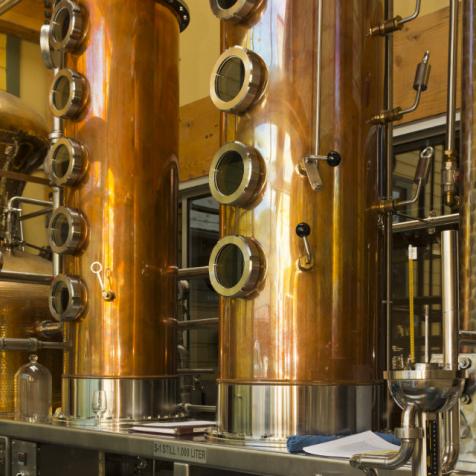
Company Details
Location
Park City, Utah
Founded
2004
Ownership Type
Private
Employees
100
Products
Spirits, restaurant
Founded: 2004
Ownership: Private (about 50 stockholders)
Employees: About 100, 80 percent restaurant, 20 percent distillery
David Perkins' Park City ski-in gastro-distillery is one a kind. His whiskeys are meeting demand in a booming spirits marketplace.
Yesteryear's mountain men and miners enjoyed spirits but High West Distillery in Park City is Utah's first legally licensed distillery since prohibition.
In December 2007, proprietor/distiller David Perkins began selling whiskey from the first legal distillery in Utah since the 1870s. Back then, even Brigham Young had a distillery.
Now Perkins oversees a distillery bursting at the seams as it expands into a new facility on a working ranch about 20 miles outside of Park City, where a 1,585-gallon still was installed in August. "We think we'll be the world's only distillery dude ranch," he quips.

Perkins' background in biochemistry prepared him for distilling. "You'd be amazed how similar it is. Basically it's the same technology. Whiskey is essentially biotechnology. You grow up an organism -- yeast, and they crank out a drug, ethanol -- and it's kind of the same thing."
The distillery is currently operated what they call the only ski-in gastro-distillery in the world -- it's right next to the ski lift in Park City. It only has a 250-gallon still. "It runs 8 days a week 25 hours a day. It's maxed out. It makes maybe three-quarters of a barrel each run," Perkins explains. "We have maybe 400 barrels we've put down since we've cranked it up."

"We sell two products now that are our own: white whiskeys, silver whiskeys," Perkins says. "The rest we put down in wood, and we might release a barrel this year -- we'll see."
The company distills these young spirits but it's been selling innovative blended whiskeys for years, including its popular Rendezvous Rye. Others are aged as many as 21 years and are blended from a mix of rye whiskey, bourbon, and even scotches for the unique Campfire blend.
"We started out with our own," Perkins says. "It quickly became clear that to make stuff, put it in a barrel and wait four to five, six years, and make payroll was a difficult proposition at best. So I met a guy that runs a distillery in Kentucky called Four Roses."
Four Roses master distiller Jim Rutledge helped Perkins with his business plan and the art of whiskey. Rutledge also encouraged Perkins to purchase other whiskeys while waiting for High West to age. "Little did I know that eight out of 15 bottles on the shelf are bought somewhere else and packaged somewhere else," he says.

Among the rye he blends are from Kentucky's Barton Distillery, Hiram Walker, the former Seagram's distillery in Indiana (now know as LDI Distillers, which produces Bulleit and Templeton‚ two popular brands), and old Four Roses bourbon. "We bought a bunch of scrap that really nobody wanted," Perkins contends. "But in retrospect, it made sense for us and helped us get our business up and running."
High West produces about 10 products, including unique mixed drinks like the 36th Vote Barreled Manhattan and the Barreled Boulevardier, but the new facility will likely change things. "When we bring out our own stuff, it'll definitely taste different from the stuff that we've been buying," Perkins says. "The key is we're building a new plant and we'll have four larger pot stills of 1,600 gallons each." That will allow High West to significantly ramp production.
The saloon will still distill, but more experimentally. "One of our dreams was to distill a lot of fruit," Perkins says. That includes local apples, peaches and pears grown on Colorado's Western slope.
Challenges: "Not striking out. We've been busy in our current facility and we don't have much room, so we're playing Tetris all day moving stuff around."
Opportunities: "Whiskey's growing, we're taking advantage of that. That's why we're building the plant. A lot of people are building capacity to take advantage of the Whiskey boom," Perkins contends.
Needs: "When you're growing you never have enough money. That's the hard fact. We can spend it on new equipment or plants," Perkins says.

